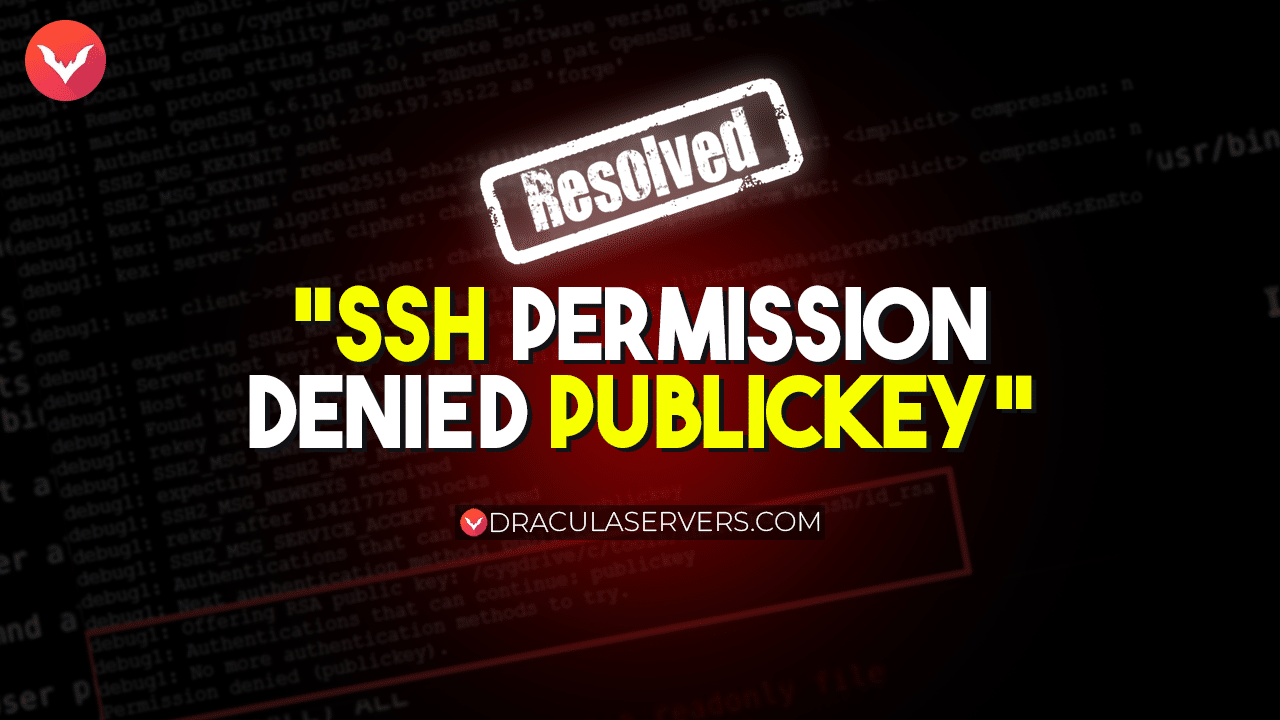SSH Permission Denied (publickey) Solved: Troubleshooting and Fixes

Encountering the “SSH Permission Denied (publickey)” error while trying to connect to a remote server can be frustrating. This error typically occurs when the SSH server doesn’t recognize your public key or when your local SSH client is unable to authenticate using the provided key. In this guide, we’ll walk you through troubleshooting steps and solutions to resolve the “SSH Permission Denied (publickey)” error.
Table of Contents
- Step 1: Verify Your Public Key
- Step 2: Copy Public Key to Remote Server
- Step 3: Check Permissions
- Step 4: Confirm Remote User
- Step 5: Debugging with -v Option
- Step 6: Password Authentication
- Step 7: Check SSH Agent
- Step 8: Key Format
- Dracula’s High-Performance Sneaker Bot Servers
- Step 9: Check Server Logs
- Step 10: Disable Password Authentication (Optional)
- Conclusion
Step 1: Verify Your Public Key
Ensure that you are using the correct public key for authentication. Your public key should be stored in the ~/.ssh/id_rsa.pub file. You can verify its content using:
cat ~/.ssh/id_rsa.pub
Step 2: Copy Public Key to Remote Server
If your public key is not present on the remote server’s ~/.ssh/authorized_keys file, you won’t be able to authenticate. Use the ssh-copy-id command to copy your public key to the remote server:
ssh-copy-id username@server_ip
Replace username with your username and server_ip with the remote server’s IP address.
Step 3: Check Permissions
Incorrect permissions on your local ~/.ssh directory and the ~/.ssh/authorized_keys file can lead to authentication failures. Make sure the permissions are set correctly:
chmod 700 ~/.ssh
chmod 600 ~/.ssh/authorized_keys
Step 4: Confirm Remote User
Ensure that you are connecting using the correct username on the remote server. If you are using a different username, specify it explicitly in your SSH command:
ssh username@server_ip
Step 5: Debugging with -v Option
When running the SSH command with the -v option, you’ll get verbose output that can help diagnose the issue. This output will provide insights into what’s happening during the authentication process.
ssh -v username@server_ip
Step 6: Password Authentication
If public key authentication is not working, you can temporarily enable password authentication to troubleshoot further. Open the SSH configuration file on the remote server:
sudo nano /etc/ssh/sshd_config
Change PasswordAuthentication from no to yes. Save the file and restart the SSH service:
sudo service ssh restart
Step 7: Check SSH Agent
Make sure your SSH agent is running and has your private key loaded:
eval $(ssh-agent -s)
ssh-add ~/.ssh/id_rsa
Step 8: Key Format
If you manually copied your public key, ensure that it is in the correct format and doesn’t have any extra spaces or line breaks.
Dracula’s High-Performance Sneaker Bot Servers
Score limited-edition kicks and stay ahead in the game with our high-performance Sneaker Servers. Designed for sneakerheads and resellers, these servers offer blazing-fast speeds and unwavering stability. Never miss a release again with DraculaServers’ Sneaker Servers by your side. Level up your sneaker-copping game now.
Ready to secure the freshest kicks? Discover the power of our Sneaker Servers Here! Don’t let slow servers hold you back—unleash your sneaker-bot’s potential with DraculaServers today.
Check out Sneaker Servers Here!
Step 9: Check Server Logs
Inspect the server’s SSH logs for any clues. You can find the logs in /var/log/auth.log or /var/log/secure:
sudo cat /var/log/auth.log
Step 10: Disable Password Authentication (Optional)
For better security, consider disabling password authentication once your key-based authentication is working:
sudo nano /etc/ssh/sshd_config
Set PasswordAuthentication to no, then restart the SSH service.
Conclusion
The “SSH Permission Denied (publickey)” error can have various causes, from incorrect key setups to permissions issues. By following these troubleshooting steps, you can diagnose and resolve the issue, ensuring a secure and seamless SSH connection to your remote server. Remember to exercise caution when making changes to system files and configurations.
Subscribe
Login
0 Comments
Oldest

